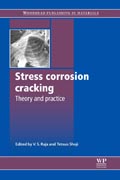
The problem of stress corrosion cracking (SCC), which causes sudden failure of metals and other materials subjected to stress in corrosive environment(s), has a significant impact on a number of sectors including the oil and gas industries and nuclear power production. Stress corrosion cracking reviews the fundamentals of the phenomenon as well as examining stress corrosion behaviour inspecific materials and particular industries. The book is divided into four parts. Part 1 covers the mechanisms of SCC and hydrogen embrittlement, while the focus of part 2 is on methods of testing for SCC in metals. Chapters in part3 each review the phenomenon with reference to a specific material, with a variety of metals, alloys and composites discussed, including steels, titanium alloys and polymer composites. In part 4, the effect of SCC in various industries is examined, with chapters covering subjects such as aerospace engineering,nuclear reactors, utilities and pipelines. With its distinguished editors andinternational team of contributors, Stress corrosion cracking is an essentialreference for engineers and designers working with metals, alloys and polymers, and will be an invaluable tool for any industries in which metallic components are exposed to tension, corrosive environments at ambient and high temperatures. INDICE: Part 1 fundamental aspects of stress corrosion cracking and hydrogen embrittlement: Mechanistic and fractographic aspects of stress-corrosion cracking; Hydrogen embrittlement phenomena and mechanisms. Part 2 Test methods for determining stress corrosion cracking susceptibilities: Testing and evaluation methods for stress corrosion cracking in metals. Part 3 Stress corrosion cracking in specific materials: Stress corrosion cracking in low and medium strength carbon steels; Stress corrosion cracking in stainless steels; Factors affecting stress corrosion cracking and fundamental mechanistic understanding ofstainless steels; Stress corrosion cracking in nickel-based alloys; Stress corrosion cracking in aluminium alloys; Stress corrosion cracking in magnesium alloys; Stress corrosion cracking and hydrogen-assisted cracking in titanium alloys; Stress corrosion cracking in copper and copper-based alloys; Stress corrosion cracking of austenitic stainless and ferritic steel weldments; Stress corrosion cracking in polymer composites. Part 4 Environmentally-assisted cracking problems in various industries: Stress corrosion cracking in boilers and cooling water systems; Environmentally-assisted cracking in oil and gas production; Stress corrosion cracking in aerospace vehicles; Prediction of stress corrosion cracking in nuclear power systems; Failures of structures and componentsby metal-induced embrittlement; Stress corrosion cracking in pipelines.
- ISBN: 978-1-84569-673-3
- Editorial: Woodhead
- Encuadernacion: Cartoné
- Páginas: 832
- Fecha Publicación: 01/09/2011
- Nº Volúmenes: 1
- Idioma: Inglés
